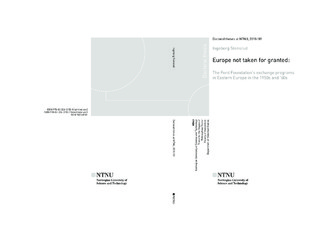| dc.contributor.advisor | Péteri, György | |
| dc.contributor.advisor | Andersen, Håkon With | |
| dc.contributor.author | Stensrud, Ingeborg | |
| dc.date.accessioned | 2018-09-13T10:43:09Z | |
| dc.date.available | 2018-09-13T10:43:09Z | |
| dc.date.issued | 2018 | |
| dc.identifier.isbn | 978-82-326-3153-7 | |
| dc.identifier.issn | 1503-8181 | |
| dc.identifier.uri | http://hdl.handle.net/11250/2562476 | |
| dc.description.abstract | Sammendrag
Hvilken virkning ville det ha på de kommunistiske landene i Europa at noen av deres «beste» ble eksponert for vestlige idéer og praksiser, særlig i USA? Ville det kunne endre de kommunistiske regimene på sikt?
Disse var de store spørsmålene da den amerikanske stiftelsen Ford Foundation satte i gang sitt første utvekslingsprogram med et kommunistisk land: Polen, i 1957. Etter mer enn ti år med iskald krig, valgte myndighetene i både USA og sovjet-sfæren å løsne litt på grepet i siste halvdel av 1950-tallet, i det såkalte «tøværet.» Å utveksle folk (en utbredt praksis i mellomkrigstiden) for å bedre forholdet mellom de to ideologiske leirene, ble igjen sett på som viktig og nyttig, og Ford Foundation ble den første amerikanske aktøren til å samarbeide med et kommunistisk regime. Det polske programmet viste seg snart som en suksess, og Ford Foundation innledet etter hvert utvekslingssamarbeid også med Jugoslavia og Ungarn. Totalt 701 personer fra disse tre landene tilbrakte opptil et år i USA på stipender fra stiftelsen.
Avhandlingen Europe not taken for granted, som først og fremst bygger på tekster i Ford Foundations arkiver, gir en detaljert historisk analyse av de tre utvekslingsprogrammene. Hovedmålet er å utforske motivene og hensiktene bak programmene i det kommunistiske Europa; andre mål er å vise hvordan opplevelsene og erfaringene ved programmene påvirket de forskjellige aktørene, og hvordan folk fra Øst og Vest oppfattet hverandre innenfor rammen av programmene. Avhandlingen konkluderer med at programmene påvirket oppfatninger og holdninger, og at de fungerte som katalysatorer for endring i den kulturelle krigen mellom Øst og Vest. | nb_NO |
| dc.description.abstract | Summary of the thesis
Would exposing select East Europeans to the ideas and practices of the capitalist West, especially to the United States of America, change the course of communism in Eastern Europe?
This was the big question when the large and powerful Ford Foundation launched its first exchange program with a communist country: Poland, in 1957. After more than ten years of hostile Cold War, a softer approach to cultural warfare was attempted by both East and West in the late 1950s, in the so-called “Thaw.” The idea that exchanging people may have a positive effect on the relationship between East and West, was catching on (as it had in the interwar years), and the Ford Foundation was the first American actor to venture into the area. The Polish program soon proved successful, and the Ford Foundation proceeded to run exchange programs also with Yugoslavia and Hungary. Carefully selected Poles, Yugoslavs and Hungarians (701 persons in total) spent periods of up to a year in the USA on Ford Foundation grants.
The thesis provides a detailed historical analysis of these three exchange programs, as they are documented in the Ford Foundation archives. The main goal is to explore the motives and intentions behind the Foundation’s programs in Eastern Europe; other goals are to show how the experiences of the programs influenced the people involved, and to uncover how “Easterners” and “Westerners” perceived each other in these encounters between East and West. First and foremost an example of empirical, historical research based on the critical analysis of texts, Europe not taken for granted argues that the East European exchange programs in the 1950s and 1960s affected perceptions and attitudes, and that they functioned as catalysts for change in the cultural war across the East-West divide. | nb_NO |
| dc.language.iso | eng | nb_NO |
| dc.publisher | NTNU | nb_NO |
| dc.relation.ispartofseries | Doctoral theses at NTNU;2018:181 | |
| dc.title | Europe not taken for granted: The Ford Foundation's exchange programs in Eastern Europe in the 1950s and '60s | nb_NO |
| dc.type | Doctoral thesis | nb_NO |
| dc.subject.nsi | VDP::Humaniora: 000::Historie: 070::Politisk historie: 071 | nb_NO |
| dc.description.localcode | Digital full text not available | nb_NO |
